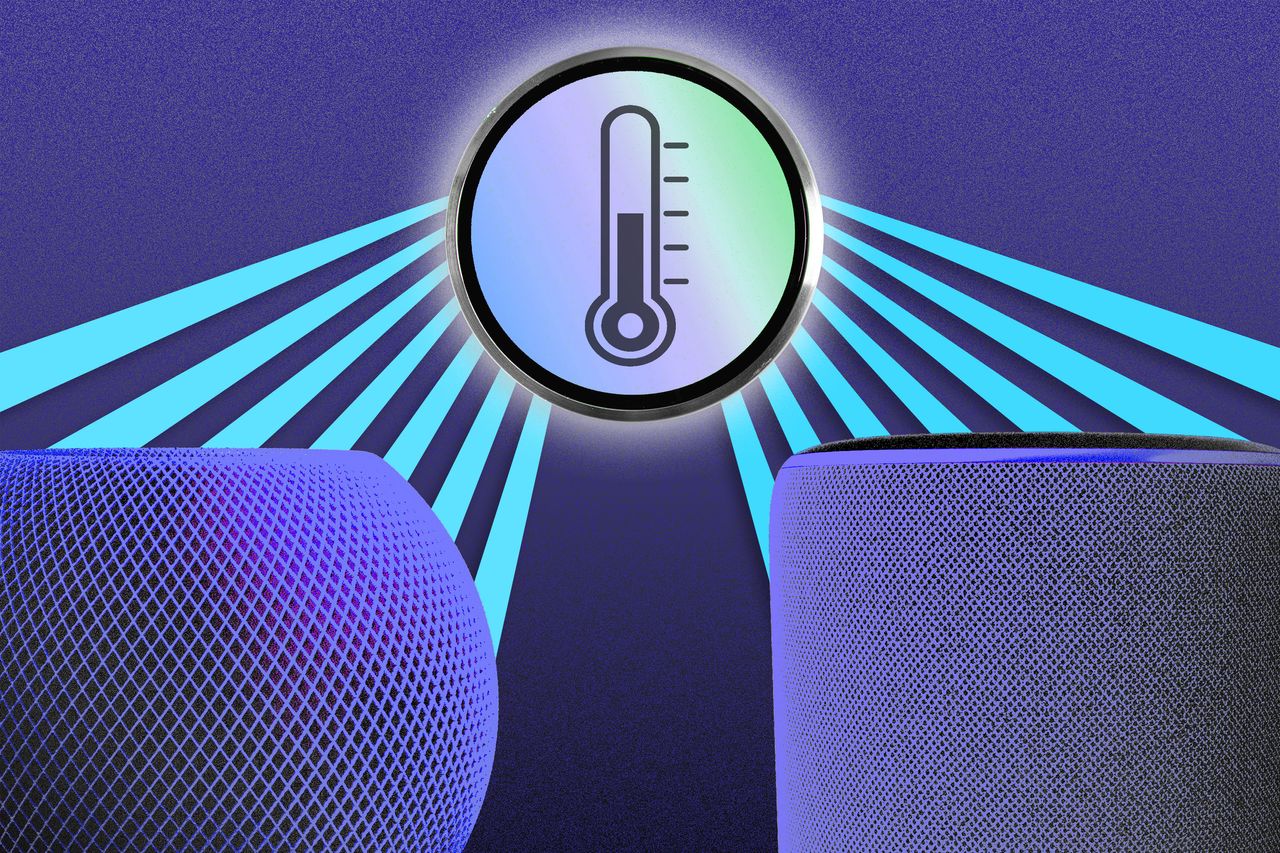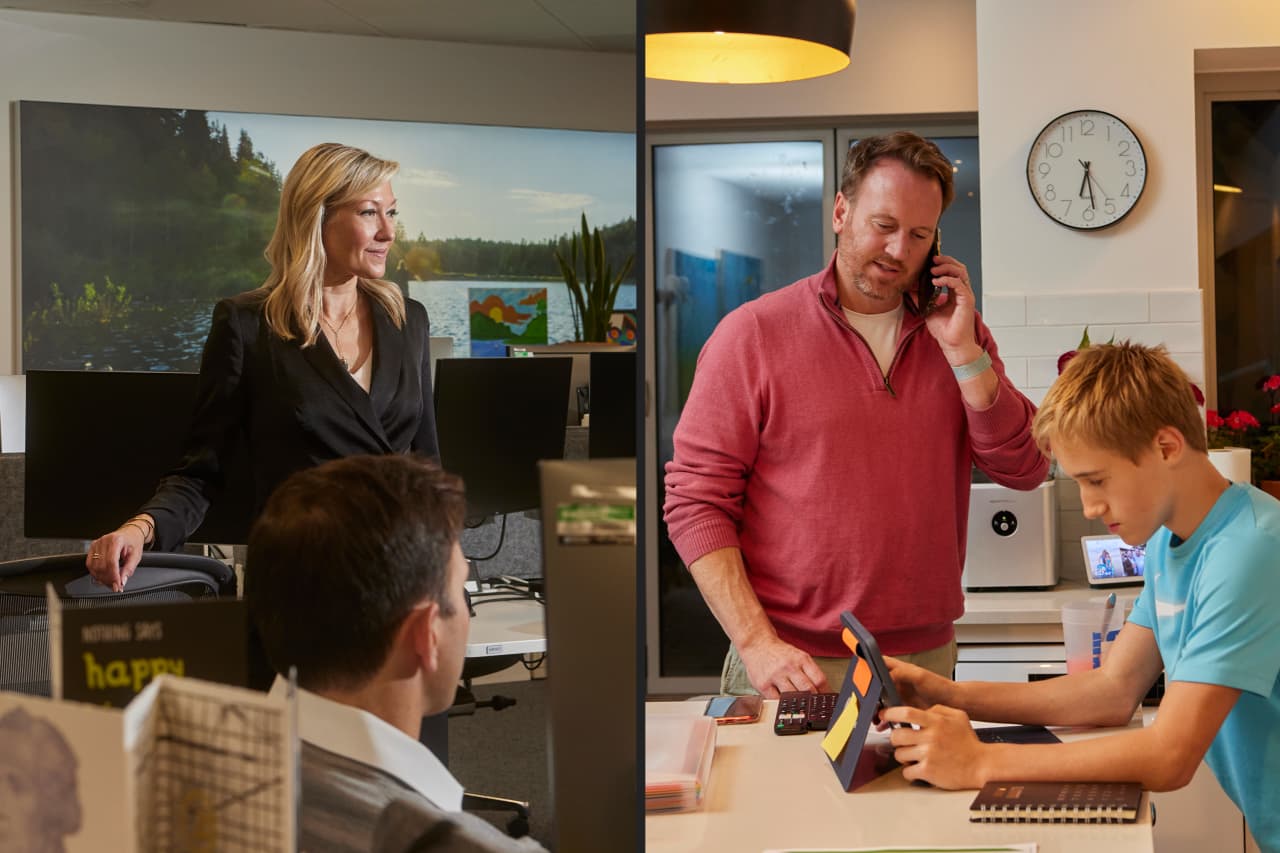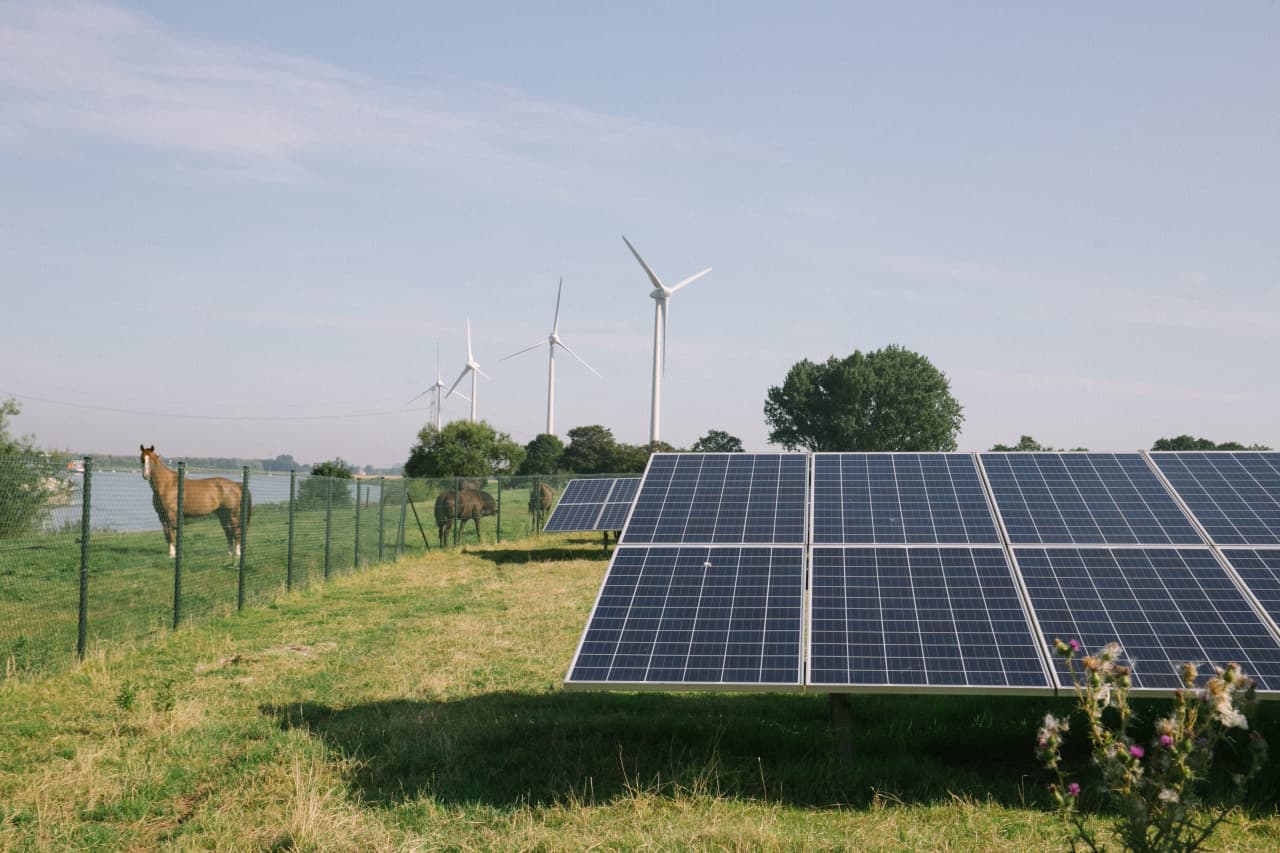Why Apple, Amazon and Google Are Uniting on Smart-Home Tech
The new standard, arriving this year, provides a common language so all your devices can communicate with each other.
If you think about smart-home gadgets at all, you probably think about energy-saving thermostats or lights you control with an app. Most people don’t worry about how they work, let alone how they might work together.
Some of tech’s biggest players—Apple Inc., Alphabet Inc.’s Google, Amazon.com Inc. and Samsung Electronics Co.—have established smart-home platforms, so your iPhone can turn off the lights or Alexa can change the thermostat without too much extra setup. But that still means shoppers must check if new products work with the tech they already have at home.
Compatibility issues and setup complexity have made people slow to go all-in with smart-home technology. A new standard, called Matter, aims to change that.
When it rolls out this year, Matter will act as a common language spoken by most new—and many older—smart-home products. You could buy any gadget you wanted and connect it to whichever app you prefer. You’ll be able to control it with the voice assistant of your choice, or even use multiple assistants and apps inside your home.
Even though Matter would work behind the scenes, it could mean more affordable devices that are easier to set up and even play nicely together.
What’s perhaps most surprising: All the biggest names in smart-home tech are on board, so going forward, you won’t be trapped in one walled garden. If you get tired of Alexa and want to switch to Apple’s HomePod Mini, you could do it without having to also buy new automated blinds. (It’s a little like the film industry going all-in on VHS back in the day.)
“We all really recognized that unless we solved some foundational problems that were hitting all of us across the industry, this industry just wasn’t going to grow,” said Michele Turner, senior director of Google smart-home ecosystem.
Along with the tech giants, over 220 other companies support Matter. Between now and the end of the decade, vendors will ship more than 5.5 billion Matter-compliant smart-home devices, according to ABI Research.
Matter is designed to be more secure and private than other smart-home systems, in part because it can perform some basic functions without sending messages to the cloud. And you probably won’t have to throw out all your old smart devices.
That’s not to say the companies supporting Matter won’t try to lock you in somehow. Matter defines basic functionality, but advanced features will still be linked to companies—like how AirPods work better with Apple devices.
‘So Dead Simple’
Initially, Matter will run in door locks; sensors for motion, air quality and more; thermostats; lighting; garage-door openers; blinds and shades; smart plugs; and smart TVs. More complex smart-home products, such as security cameras, robot vacuums and appliances, won’t be supported at launch.
When a developer wants to add a feature to its smart-home product, it has to expend resources to update the software for every platform. With Matter, most changes would only need to be made once, so developers could lower their prices.
Once you get your Matter-compatible product home, setup will be easy—you would just scan a QR code to add it to your network. “The goal is for the vast majority of devices out there—lights, plugs, switches, sensors—to make that initial setup so dead simple that it just takes a couple of seconds,” said Ms. Turner.
You can give your housemates smart-home access, letting them turn on the lights with Alexa while you use Siri. And if you have a mishmash of gear in your home, you might even get it all to work together. Right now, most people buy smart-home devices to address a “singular need,” said Adam Wright, an analyst with technology research firm International Data Corp., but that could change as more are compatible with Matter.
Quitting the Cloud
Google and Amazon’s home devices regularly communicate with the cloud, while Apple’s HomeKit is designed to work without as much internet dependence. Smart-home commands stay inside your home, which can make responses faster and more private. Matter takes a similar approach to HomeKit. If there’s an internet outage, your Matter-enabled products could still work, much like how your Wi-Fi printer still operates when your broadband is down.
“All smart-home accessories will have the same level of security, privacy and ease of use that Apple customers enjoy today with HomeKit accessories,” Apple spokeswoman Jacqueline Roy said.
In the past, Eve Systems GmbH didn’t link its smart plugs and sensors with Google and Amazon because they depend on the cloud, said Tim Both, Eve’s senior brand and product manager. Eve didn’t want to be responsible for user data. With Matter, the system’s data can stay inside your home, even if you use Google or Amazon’s platforms.
Amazon and others will still use the cloud for some things. Older Alexa-enabled smart speakers can’t process commands without it, said Chris DeCenzo, a principal engineer at Amazon working on smart home and Alexa devices, adding that the cloud is “a critical component of infrastructure for many, many smart-home devices and services today.”
All New Stuff?
If you already bought into the smart-home life, you won’t have to start over. Not completely, anyway.
All Philips Hue lights will work with Matter when the Hue bridges that control them get updated software, said George Yianni, co-founder of the Philips Hue lighting business, who now runs its R&D for parent company Signify NV. “Even ones we sold 10 years ago will become Matter-compatible.”
Most newer products from the giants will work with the new standard. Google’s Nest Wifi and its recent Hub displays will become connection points for Matter, while all Nest displays and speakers will get updates to control Matter devices. The newest Nest Thermostat will be compatible as well.
Nearly all Amazon Echo devices will let you set up and control Matter, too. Apple’s HomePod Mini and second-generation Apple TV 4K will be able to act as Matter hubs, as will Samsung’s SmartThings Hub v3.
Products that can’t be updated will continue to work as before, just without the increased compatibility. Assa Abloy Group will upgrade some of its Yale locks, but it can’t update its August line. Matter wasn’t designed “in a way that we can reliably run it on a Wi-Fi lock that runs on batteries,” said Jason Williams, president of the company’s August and Yale smart-lock businesses. The batteries would drain quickly, creating a poor user experience.
Some Yale locks can be upgradable with a hardware module—so you don’t have to buy a new lock but you still might have to spend a bit extra. The company aims to make all future consumer locks work with Matter, Mr. Williams said.
Despite any initial shortcomings, Matter may be the key to smarter homes, even the homes of people without Ph.D.s in electrical engineering.
“We know we’re competing with a light switch,” said Samantha Fein, vice president of business development and marketing at Samsung’s SmartThings. “So if it’s not as easy as that, we’re not going to get anywhere.”
 Copyright 2020, Dow Jones & Company, Inc. All Rights Reserved Worldwide. LEARN MORE
Copyright 2020, Dow Jones & Company, Inc. All Rights Reserved Worldwide. LEARN MORE
This stylish family home combines a classic palette and finishes with a flexible floorplan
Just 55 minutes from Sydney, make this your creative getaway located in the majestic Hawkesbury region.
The remote northern island wants more visitors: ‘It’s the rumbling before the herd is coming,’ one hotel manager says
As European hot spots become overcrowded , travellers are digging deeper to find those less-populated but still brag-worthy locations. Greenland, moving up the list, is bracing for its new popularity.
Aria Varasteh has been to 69 countries, including almost all of Europe. He now wants to visit more remote places and avoid spots swarmed by tourists—starting with Greenland.
“I want a taste of something different,” said the 34-year-old founder of a consulting firm serving clients in the Washington, D.C., area.
He originally planned to go to Nuuk, the island’s capital, this fall via out-of-the-way connections, given there wasn’t a nonstop flight from the U.S. But this month United Airlines announced a nonstop, four-hour flight from Newark Liberty International Airport in New Jersey to Nuuk. The route, beginning next summer, is a first for a U.S. airline, according to Greenland tourism officials.
It marks a significant milestone in the territory’s push for more international visitors. Airlines ran flights with a combined 55,000 seats to Greenland from April to August of this year, says Jens Lauridsen, chief executive officer of Greenland Airports. That figure will nearly double next year in the same period, he says, to about 105,000 seats.
The possible coming surge of travellers also presents a challenge for a vast island of 56,000 people as nearby destinations from Iceland to Spain grapple with the consequences of over tourism.
Greenlandic officials say they have watched closely and made deliberate efforts to slowly scale up their plans for visitors. An investment north of $700 million will yield three new airports, the first of which will open next month in Nuuk.
“It’s the rumbling before the herd is coming,” says Mads Mitchell, general manager of Hotel Nordbo, a 67-room property in Nuuk. The owner of his property is considering adding 50 more rooms to meet demand in the coming years.
Mitchell has recently met with travel agents from Brooklyn, N.Y., South Korea and China. He says he welcomes new tourists, but fears tourism will grow too quickly.
“Like in Barcelona, you get tired of tourists, because it’s too much and it pushes out the locals, that is my concern,” he says. “So it’s finding this balance of like showing the love for Greenland and showing the amazing possibilities, but not getting too much too fast.”
Greenland’s buildup
Greenland is an autonomous territory of Denmark more than three times the size of Texas. Tourists travel by boat or small aircraft when venturing to different regions—virtually no roads connect towns or settlements.
Greenland decided to invest in airport infrastructure in 2018 as part of an effort to expand tourism and its role in the economy, which is largely dependent on fishing and subsidies from Denmark. In the coming years, airports in Ilulissat and Qaqortoq, areas known for their scenic fjords, will open.
One narrow-body flight, like what United plans, will generate $200,000 in spending, including hotels, tours and other purchases, Lauridsen says. He calls it a “very significant economic impact.”
In 2023, foreign tourism brought a total of over $270 million to Greenland’s economy, according to Visit Greenland, the tourism and marketing arm owned by the government. Expedition cruises visit the territory, as well as adventure tours.
United will fly twice weekly to Nuuk on its 737 MAX 8, which will seat 166 passengers, starting in June .
“We look for new destinations, we look for hot destinations and destinations, most importantly, we can make money in,” Andrew Nocella , United’s chief commercial officer, said in the company’s earnings call earlier in October.
On the runway
Greenland has looked to nearby Iceland to learn from its experiences with tourism, says Air Greenland Group CEO Jacob Nitter Sørensen. Tiny Iceland still has about seven times the population of its western neighbour.
Nuuk’s new airport will become the new trans-Atlantic hub for Air Greenland, the national carrier. It flies to 14 airports and 46 heliports across the territory.
“Of course, there are discussions about avoiding mass tourism. But right now, I think there is a natural limit in terms of the receiving capacity,” Nitter says.
Air Greenland doesn’t fly nonstop from the U.S. because there isn’t currently enough space to accommodate all travellers in hotels, Nitter says. Air Greenland is building a new hotel in Ilulissat to increase capacity when the airport opens.
Nuuk has just over 550 hotel rooms, according to government documents. A tourism analysis published by Visit Greenland predicts there could be a shortage in rooms beginning in 2027. Most U.S. visitors will stay four to 10 nights, according to traveler sentiment data from Visit Greenland.
As travel picks up, visitors should expect more changes. Officials expect to pass new legislation that would further regulate tourism in time for the 2025 season. Rules on zoning would give local communities the power to limit tourism when needed, says Naaja H. Nathanielsen, minister for business, trade, raw materials, justice and gender equality.
Areas in a so-called red zone would ban tour operators. In northern Greenland, traditional hunting takes place at certain times of year and requires silence, which doesn’t work with cruise ships coming in, Nathanielsen says.
Part of the proposal would require tour operators to be locally based to ensure they pay taxes in Greenland and so that tourists receive local knowledge of the culture. Nathanielsen also plans to introduce a proposal to govern cruise tourism to ensure more travelers stay and eat locally, rather than just walk around for a few hours and grab a cup of coffee, she says.
Public sentiment has remained in favour of tourism as visitor arrivals have increased, Nathanielsen says.
—Roshan Fernandez contributed to this article.
This stylish family home combines a classic palette and finishes with a flexible floorplan
Just 55 minutes from Sydney, make this your creative getaway located in the majestic Hawkesbury region.






















